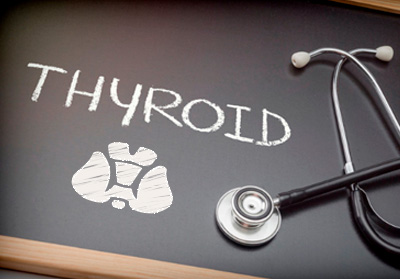
How Your Thyroid Works
Of all the parts of the body, one of the least-discussed in popular health publications is the thyroid. Sure, most may have heard the word in some context or other, but the number of people that know what the thyroid is and what it does is far lower, we suspect. This is a pity, because not only is the thyroid a major organ that does lots of important things for our body, but it can also develop problems which, if undiagnosed and untreated, can cause serious quality-of-life issues for the average person. So what is the thyroid, and how does it work?
To put it simply, the thyroid is a small gland, about the shape of a butterfly, located in the lower part of the neck below the Adam’s apple. If you’re feeling around your own neck for where it is, don’t worry: a normal-size thyroid can’t be felt by touching the neck. The thyroid is responsible for synthesizing and secreting two important hormones: thyroxine and diiodothyronine. These hormones are critical for the proper functioning of the body. As we grow from infancy through childhood, thyroid hormones help the brain grow and develop, as well as the body. In addition to growth, thyroid hormones help to influence our metabolism as well as our body temperature. When our thyroid is working properly, we have a consistent internal body temperature, and our weight will go up, down, or remain the same commensurate with our food intake.
The thyroid utilizes iodine, an important mineral that’s common in the Western diet, and uses it to synthesize and create its hormones. Selenium (in the form of selenoproteins) help convert one hormone to another, as well as clean up free radicals left over from the hormone synthesis process. When the thyroid is working as designed, the body’s systems work as they should, as all cells throughout the body depend on thyroid hormones to regulate their metabolic processes.
However, there are things that can go wrong with the thyroid and affect its hormonal output, leading to what are known as thyroid conditions. Far from being rare occurences, it turns out that nearly 20 million people in the United States alone have some form of serious thyroid issue, and worse, up to 60% of those people have no idea they have it. The most common of these problems are the following:
-
Hypothyroidism. This is a condition where the thyroid produces less hormones than normal. The causes of this can include thyroid inflammation caused by an autoimmune disorder, an iodine deficiency, or surgery from removing a nodule from the thyroid leaving not enough of the gland left to produce hormones for the body. Symptoms of this include feeling excessively cold, weight gain, lethargy, and constipation. This condition is often permanent, and is commonly treated with synthetic thyroid hormones.
-
Hyperthyroidism. This condition is characterized by an excessive amount of thyroid activity and output. This can be caused by Graves’ disease (an autoimmune condition where your body’s antibodies cause your thyroid to overproduce hormone), Plummer’s disease (where parts fo the thyroid individually produce too much hormone) and thyroiditis. Symptoms of this include having a goiter (enlarged thyroid), as well as sleeplessness, anxiety, rapid heartbeat, excessive weight loss, irritability, and diarrhea. This condition is usually treated with surgery, anti-thyroid medication, radioactive iodine, or beta-blockers.
-
Thyroiditis. This is a temporary condition in which your thyroid becomes inflamed. The most common cause of this is an autoimmune condition called Hashimoto’s thyroiditis, where your body’s antibodies – which normally are there to fight off infections – decide to attack your thyroid cells. The resulting damage and inflammation can lead to pain, overproduction of thyroid hormone, and other problems. This is typically treated with beta-blockers and pain relievers.
The rise in internet health literature has led to lots of people self-diagnosing, and thyroid issues are one popular self-diagnosed cause for various symptoms that match with some of the afore-mentioned conditions. However, thyroid issues are extremely important, and the most important part of dealing with them is knowing for a fact that you have them. The only way to know for sure if you have a thyroid condition is to go to a doctor and have lab tests done. They will check the levels of substances in your blood, do a physical test (feeling around the thyroid), and look at your family history, along with other tests if necessary. Only then will you know if you have a thyroid condition, and only your doctor will be in a position to recommend a course of treatment for it.
The thyroid, its effect on the body, and the dire consequences that occur when things go wrong with it are a testament to how something so small – and rarely discussed – can have such a large impact on our overall health and wellbeing.